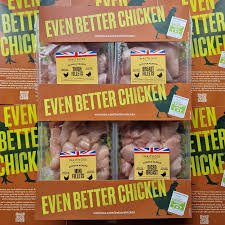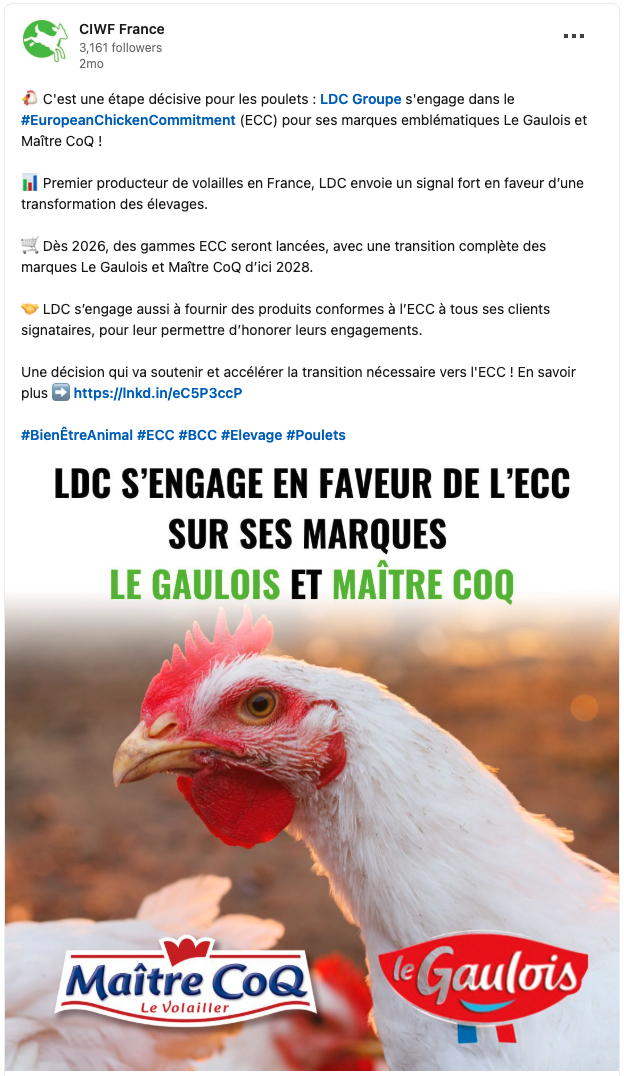1.3 billion European chickens now face better futures
While the Better Chicken Commitment (BCC) is new in Australia, in Europe, many companies are approaching the ten-year anniversary of their first commitments to higher welfare standards for chickens.
At Better Chicken Australia, we look to the success of our colleagues in Europe to build our vision of better lives for chickens here in Australia.
Better Chicken Australia is an active member of the Open Wing Alliance (OWA), a global coalition of 95 organisations working together to improve the lives of chickens raised for eggs and for meat.
The OWA’s 2025 European Chicken Commitment (ECC) Progress Report shows significant progress in European commitments and fulfilments since its launch in 2017. The ECC requirements are the same as the BCC, with the additional condition of full compliance with all EU animal welfare laws and regulations.
We’ve unpacked some of the case studies and key achievements in the report to demonstrate what could be accomplished here in Australia for chickens.
Wins for chickens so far
Since 2024, an additional 220 million chickens in Europe are now covered by the BCC, bringing to total to 1.3 billion chickens under corporate commitments. Of these, more than 260 million birds are already living under the full BCC requirements.
There are now 394 companies signed up to the BCC in Europe – many of which operate across multiple countries.
The three largest chicken producers in Europe have taken up BCC production at scale, while the twelve biggest companies with commitments are reporting compliant progress.
Image: Open Wing Alliance, ECC Progress Report 2025
Image: @waitrose_jesmond (Instagram)
Waitrose (UK supermarket)
In the UK, the high-end supermarket Waitrose has required all its own-brand fresh chicken meat and chicken products to be 100% BCC compliant since September this year. They’ve accomplished this ahead of schedule - originally, their roadmap had a 2026 deadline.
What’s even more impressive is that they’ve done this without any shelf price increases.
The supermarket chain has introduced its own welfare labelling system and removed its two lowest-welfare tiers when the entire own-brand product range met the BCC requirements.
This demonstrates that, when a brand is truly committed to animal welfare, they have the power to follow through on their promises within set timeframes.
The 37 million birds in Waitrose’s supply chain are now living much better lives thanks to their outstanding animal welfare leadership.
Norsk Kylling (Norwegian chicken producer)
One of Norway’s largest chicken producers, Norsk Kylling, farms 13 million chickens a year and accounts for 27% of the country’s chicken meat market. In 2022, they became the world's first major producer to be 100% BCC compliant, after making the commitment just two years prior.
They’re an excellent case study of how raising animal welfare standards and growing fewer birds doesn’t mean lower efficiency. Since transitioning to BCC standards, Norsk Kylling has reported:
39% lower daily mortality
79% lower deaths during transport
80% lower incidence of ascites (a heart condition that can lead to fatal heart attacks)
While the company now produces 3 million fewer chickens each year, their improved breeding and living conditions mean fewer of them are dying before slaughter. As a result, Norsk Kylling still produces the same amount of meat from fewer chickens who live better lives. Their pricing has stayed the same or even lower than conventional fast-growing chickens on the Norwegian market.
2 Sisters Food Group (UK producer)
2 Sisters is the UK’s largest supplier of meat chickens – and 20% of their flock is now BCC-compliant. That translates to 100 million chickens every year living better lives.
The company recently announced it will be reducing its entire flock to a maximum stocking density of 30kg/m², one of the key BCC requirements.
REWE & LIDL (German supermarkets)
Both companies partnered with the Albert Schweizer Foundation to amend an existing German certification scheme to meet the BCC criteria (and for some tiers, exceed the BCC). This created a pathway for REWE, LIDL, and many more businesses to meet their BCC commitments.
Image: Compassion in World Farming France, LinkedIn
LDC (French chicken company )
The biggest poultry meat company in Europe, LDC, has committed to transition all its own-brand chicken to BCC by 2028. That’s 120 million birds every year! Not only that, but LDC has also committed to supporting other companies in France in meeting their own commitments, helping as many as 180 million additional chickens.
France is a particular success story for the BCC. There are 135 commitments in France, the most of any European country, second in the world only to the USA. All major supermarkets in France have BCC commitments and are making progress on their supply transitions. One of these companies, Carrefour, operates internationally and has commitments in Spain, Italy, and Poland as well. All leading chicken producers in France are committed to supplying BCC birds.
The entire Danish convenience store sector
Every single convenience store in Denmark (about 40 companies) have committed to the BCC. Plus, five Danish supermarkets are phasing out fast-growing chickens in their fresh and frozen categories, accounting for 80-95% of their total chicken sales by volume.
Accor (global hotel company)
Hotel giant Accor, the largest hotel company in Europe and sixth-largest globally, is committed to meeting the BCC across Europe, Canada, and the United States. Accor is the parent company of many hotel brands, including Sofitel, Grand Mercure, and Ibis.
More multinational catering companies and manufacturers
The three largest contract catering companies in Europe (Sodexo, Elior Group, and Compass Group) are BCC signatories. These are huge commitments – their revenues are larger than the next 20 biggest caterers combined.
EU-wide commitments made by manufacturers include the biggest frozen food company Nomad Foods (with sub-brands including Bird’s Eye), GB Foods, Kraft Heinz, Apetito, Frosta, Nestlé (including all its sub-brands), Unilever, and Danone.
Europe is radically improving the lives of chickens
All six major chicken markets in Europe (the UK, France, Germany, Spain, Poland, and Italy) are making significant progress, especially in the critical retail sector (the most important businesses for driving change).
The Better Chicken Commitment is also proving itself not just good for chickens – it's good for business. The two supermarkets who have been 100% BCC compliant for some time, Marks & Spencer in the UK and REMA 1000 in Norway, have experienced exceptional market growth following their switch. The success of Norwegian producer Norsk Kylling’s switch to the BCC also demonstrates that there’s no need to trade-off between profits and ethics.
All of this is evidence that the Australian chicken industry’s excuses are just that – excuses. Bringing the BCC to Australia is a choice that the industry must make. We can improve the lives of chickens raised for meat – if Aussie food businesses listen to community concerns and commit to doing better.



